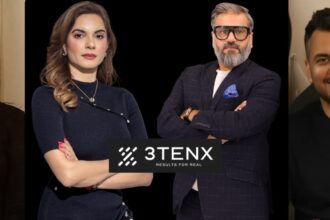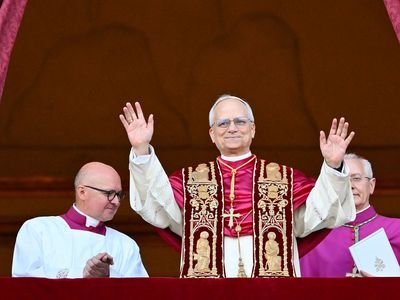Born: September 14, 1955, Chicago, Illinois, United States
Birth Name: Robert Francis Prevost
Elected Pope: May 8, 2025
Nationality: American and Peruvian (naturalized 2015)
Religious Order: Augustinian Order (O.S.A.)
Current Role: Pope, Head of the Roman Catholic Church and Sovereign of the Vatican City State
Early Life and Education
Pope Leo XIV was born Robert Francis Prevost on September 14, 1955, in Chicago, Illinois, on the city’s South Side. The son of Louis Prevost, a school principal, and Mildred Martínez Prevost, a librarian of Puerto Rican heritage, he was raised in a devout Catholic household. He was one of three children.
Prevost attended local Catholic schools and served as an altar boy, experiences that shaped his early sense of vocation. He began his formal religious education at St. Augustine Seminary High School in Holland, Michigan, graduating in 1973. He went on to earn a Bachelor’s degree in Mathematics from Villanova University in 1977, before entering the Augustinian novitiate that same year.
In 1982, after taking his solemn vows, he was ordained a priest. That same year, he completed a Master of Divinity from Catholic Theological Union in Chicago. He then pursued advanced studies in Rome, receiving a Licentiate and Doctorate in Canon Law from the Pontifical University of St. Thomas Aquinas (Angelicum). His doctoral thesis examined the role of local priors in the Augustinian order.
Missionary and Pastoral Work in Peru
In 1985, Fr. Prevost began missionary work in Peru, where he became chancellor of the territorial prelature of Chulucanas. He returned briefly to the U.S. to serve as director of vocations and missions for the Midwest Augustinians, but by 1988 he was back in Peru, where he spent the next decade in Trujillo. There, he directed an Augustinian seminary and held several key roles:
- Parish Priest
- Professor of Canon Law
- Prefect of the Diocesan Seminary of Trujillo
- Judicial Vicar of the Trujillo Archdiocese
Prevost became a respected figure in Peruvian ecclesiastical circles, blending theological rigor with pastoral compassion. He returned to Chicago in 1999 to serve as Prior of Our Mother of Good Counsel, though later scrutiny arose regarding his involvement in allowing a credibly accused priest to live in a monastery near a school — a decision his defenders said followed the existing protocol of the time.
Leadership of the Augustinians and Episcopal Service
In 2001, Prevost was elected Prior General of the Augustinian Order, relocating to Rome. He served two six-year terms (2001–2013), earning a reputation as a capable, fair, and diplomatic administrator.
In 2014, Pope Francis appointed him apostolic administrator of Chiclayo, Peru. A year later, he was made Bishop of Chiclayo, and he served the Peruvian Episcopal Conference as Second Vice President and Council Member (2018–2023). While he was praised for his role in fostering unity amid political and theological tension, he was also criticized for perceived mishandling of abuse allegations in the diocese — a controversy that resurfaced during his papal election.
One of his most important contributions during this period was his involvement in the truth commission investigating the Sodalitium Christianae Vitae (SCV), a conservative Peruvian religious group accused of abuse and authoritarianism. His efforts contributed to the official dissolution of SCV by Pope Francis in April 2025.
Elevation to the Roman Curia and Cardinalate
In January 2023, Prevost was appointed Prefect of the Dicastery for Bishops, one of the most influential positions in the Vatican, overseeing the global selection of bishops. He also became President of the Pontifical Commission for Latin America.
His performance in these roles — balancing progressive and conservative expectations — helped pave the way for his elevation to the College of Cardinals later in 2023 by Pope Francis.
Papacy: Leo XIV (2025–Present)
On May 8, 2025, following the death of Pope Francis, Cardinal Robert Prevost was elected Pope Leo XIV, becoming the first American pope and the second from the Western Hemisphere. His election marked a historic moment for the Church, breaking a longstanding precedent that popes should not come from global superpowers.
In his first address to the faithful from St. Peter’s Square, Leo XIV quoted St. Augustine, stating:
“With you I am a Christian, for you a bishop. So may we all walk together towards that homeland that God has prepared for us.”
The choice of the name Leo XIV was seen as symbolic. The last pope with that name, Leo XIII (1878–1903), was known for social teaching and dialogue with civil powers, particularly through his encyclical Rerum novarum (1891). Leo XIV explicitly linked his choice to that legacy, stating it holds deep relevance in the age of artificial intelligence, inequality, and ecological crisis.
He also emphasized the enduring vision of the Second Vatican Council and reiterated support for Evangelii Gaudium (2013), Pope Francis’s vision of a Church that prioritizes the poor and celebrates global diversity.
Public Stances and Leadership Style
Pope Leo XIV is known as a political moderate and pastoral pragmatist. Though less outspoken than some of his peers, he supports key initiatives of Pope Francis, particularly in areas such as:
- Environmental stewardship
- Immigrant rights
- Global economic justice
Shortly before his election, Leo publicly challenged the interpretation of Christian doctrine by U.S. Vice President J.D. Vance, who invoked St. Augustine’s ordo amoris to defend harsh immigration policies. Then-Cardinal Prevost denounced the misuse of Augustine’s theology to justify exclusion and deportation.
However, on sensitive doctrinal issues like same-sex blessings and the ordination of women as deacons, Leo XIV has been more cautious, avoiding explicit endorsements while calling for “discernment, listening, and unity” within the global Church.
Legacy and Outlook
At age 69, Pope Leo XIV inherits a deeply complex Church — one facing internal division, institutional reform, and the challenge of remaining relevant in an increasingly secular and digital world.
With his Augustinian roots, missionary experience, and deep ties to both North and South America, Leo XIV stands uniquely positioned to guide the Roman Catholic Church into a new era of global inclusiveness, pastoral renewal, and social consciousness.
His legacy, still in its early chapters, is being watched closely by both conservatives and reformers, as the Church once again navigates its mission in a fractured yet hopeful world.






